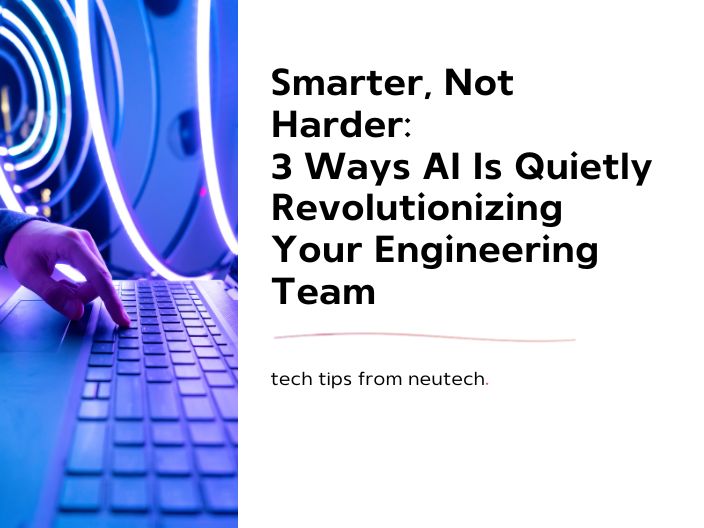Smarter, Not Harder: 3 Ways AI Is Quietly Revolutionizing Your Engineering Team

A while back, during my conversation on the Big Players podcast with Matt Berman (watch it here), we got into the weeds on AI’s role in modern software development. Not just the flashy stuff like vibe coding, but the behind-the-scenes workflows that make senior engineers faster, teams more productive, and products more resilient.
That conversation reminded me of how often founders and CTOs overlook the real value of AI in engineering. It’s not just about building faster—it’s about building better. And when you apply AI to the right parts of your workflow, it frees up time, removes friction, and adds a layer of quality control that would be hard (and expensive) to replicate with human effort alone.
So here it is: the three phases we use at Neutech to integrate AI into engineering productivity—with real tools, real examples, and strategies you can implement now.
Phase 1: Write Better Tickets, Get Better Code
Every founder has had the “I thought you meant…” moment.
Misaligned expectations between product, engineering, and leadership are one of the biggest time sucks in software development. And it often starts with a vague task description or an unclear feature request – that’s where AI comes in.
At Neutech, our teams use large language models like Claude to turn shorthand ideas into well-structured development tickets. These AI-generated prompts help define clear acceptance criteria, identify edge cases, and even suggest test conditions. Instead of tossing a half-baked Jira card at an engineer, we hand them a fully defined, context-rich task.
The result? Less back-and-forth. Fewer revisions. And a shared understanding from the start.
Phase 2: Smarter Code Reviews (With a 24/7 AI Teammate)
Every engineer knows the pain of nitpicky code reviews – tabs vs. spaces, missed security flags, and those awful “did you forget the null check?” moments.
That’s where tools like CodeRabbit shine. It acts as a tireless peer reviewer that flags issues against your team’s specific architecture and standards. You can define patterns, security checks, and formatting rules—and let the AI enforce them with every pull request.
What used to take 20 minutes of a senior engineer’s time can now be reviewed instantly, which frees up your best minds to focus on what actually matters: architectural decisions, scaling challenges, and creative problem-solving.
Even better? CodeRabbit helps junior and mid-level devs level up. It teaches them what “good code” looks like, without relying entirely on overburdened leads to coach them.
In our own dev pods at Neutech, we use CodeRabbit to:
- Catch common anti-patterns
- Ensure consistent formatting across teams
- Flag potential security and logic vulnerabilities
It’s not about automating people out of the process. It’s about helping the entire team build muscle around quality.
Phase 3: Proactive Monitoring with New Relic + Fewer 3 a.m. Fire Drills
Most dev teams operate reactively. Something breaks, a user complains, and suddenly you’re pulling logs in the middle of the night.
But AI-driven monitoring tools like New Relic flip that model on its head.
At Neutech, we use New Relic to set up proactive alerts across the stack. The AI tracks performance anomalies, slowdowns, and odd behavior before users even notice. Instead of waiting for a bug report, we get pinged when API latency creeps up or memory leaks start to form.
That’s not just a time-saver, it’s a reputation-saver. Because nothing kills trust like an outage you didn’t see coming.
And if you’re trying to build trust with enterprise clients, uptime is non-negotiable. You can’t afford to be surprised by performance issues—and with AI watching your back, you don’t have to be.
AI Is the New Team Member (If You Let It Be)
Here’s the thing: AI isn’t replacing your dev team but it is changing how your best people work.
The CTOs and product leaders who embrace these shifts aren’t just building faster—they’re building with fewer errors, clearer communication, and higher morale. No one likes chasing down vague tickets or debugging spaghetti code at midnight.
AI gives your team a boost at every layer of the stack. From shaping tickets to reviewing code to keeping the lights on, it makes good developers great—and great teams unstoppable.
If you want help figuring out how to apply these systems in your workflow, let’s talk. We build modern development teams who don’t just code—they deliver.
And if your engineering or tech podcast needs a guest who can nerd out on this stuff? I’m in.